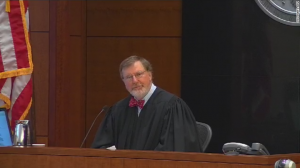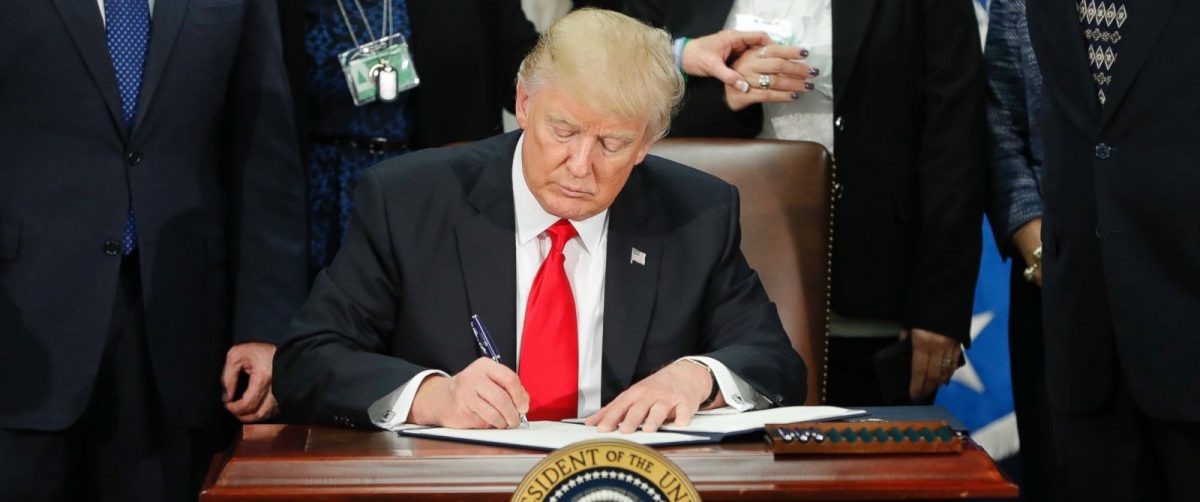U.S. District Court Judge James Robart entered a temporary restraining order on Friday, preventing implementation of President Trump’s immigration order. Judge Robart applied his directive on a nationwide basis. The only problem with this Federal court analysis and the monumental judgment is that it is wrong. Judge Robart’s written opinion cited no authority, constitutional or otherwise, to support his judgment that the States involved “are likely to succeed on the merits . . . [and that] the States are likely to suffer irreparable harm . . . [and that] the balance of the equities favor the States.”
We aren’t surprised by Judge Robart’s failure to cite legal authority. His was an extraordinary decision. In a case where the President of the United States cited a national security purpose for his executive action, Judge Robart struck down that judgment and substituted his own. At the very least, a Federal court judge owes the American public a complete dissertation explaining why the President is wrong and he is right. He offered up nothing.
Federal Court Analysis of the Massachusetts Court is Detailed – And Correct
On the other hand, this past Friday also witnessed a decision of another Federal judge upholding the Trump Order. The Boston court’s decision, which received little attention in the national press, contains a detailed Constitutional analysis. And it is correct. In plain language the Boston court explained why the Trump order will ultimately be enforced.

We analyze the Boston court’s decision below. The Boston court reviewed all of the constitutional claims that could be made against the Trump Order. This Federal court analysis debunks each one of those legal arguments. Judge Robart’s failure to expressly address any of these arguments is unfathomable. He provided the public with no rational way to understand his application of the law. Judge Robart undermined the rule of law and created the appearance that the President acted outside of his authority. He simply caused Americans to further question the government and breached his responsibility to explain why.
But Judge Robart’s essential mistake boils down to this. He is wrong on the law. And here’s why.
Court’s Don’t Second Guess the President on Immigration Matters Where There is a “Rational Basis” for His Actions
The Supreme Court has long held that decisions to prevent aliens from entering the United States are a “fundamental sovereign attribute” effectuated through the elected branches of government that are “largely immune from judicial control.”[note]See Shaughnessy v. U.S. ex rel. Mezei, 345 U.S. 206, 210 (1953) [/note] The Supreme Court has stated that a “rational basis” test applies with respect to immigration matters such as this.
In a “rational review” analysis the government must only demonstrate that “the classification at issue bears some fair relationship to a legitimate public purpose.”[note] See Plyler v. Doe, 457 U.S. 202 at 216 (1982)[/note] The Supreme Court has stated that a rational basis review “is not a license for courts to judge the wisdom, fairness or logic of legislative choices.” [note]See Heller v. Doe by Doe, 509, U.S. 312 (1993)[/note] Rather, an immigration classification established by the elected branches of government is permissible under rational basis review “if there is any reasonably conceivable state of facts that could provide a rational basis.” [note]See FCC v. Beach Communications, Inc.,508 U.S. 307 at 313 (1993)[/note]
Judge Robart either forgot or overlooked the Supreme Court’s admonition in Heller v. Doe by Doe. He ignored the Supreme Court’s recognition that immigration law involves a “delicate policy judgment” that courts should not invade.[note] See Plyler v. Doe at 225[/note] And just as importantly, Judge Robart ignored the directive of his own appellate court, the Ninth Circuit, which recognizes that “we defer to the political branches in the immigration field.”[note]See Ruiz-Diaz v. U.S., 703 F.3d 483 (9th Cir. 2012)[/note]
The Trump Order Easily Satisfies the Rational Basis Test
Whether we like it or not, the Trump Order easily satisfies the requirements of the rational basis test. The Massachusetts Federal Court made this clear. It reviewed the text of the Trump Order, whose purpose is
[T]o ensure the proper review and maximum utilization of available resources for the screening of foreign nationals, and to ensure that adequate standards are established to prevent infiltration by foreign terrorists . . . .
The Boston court concluded on this basis that the Trump Order:
[S]pecifically asserts that permitting aliens from the countries identified . . . to enter “would be detrimental to the United States.” The order provides a reasonably conceivable state of facts [which concerns national security and] that could provide a rational basis for the classification.
Accordingly the Boston court, as it must, “declines to encroach upon the ‘delicate policy judgment’ inherent in immigration decisions.”
Under a rational basis review the actual reasons for the law or order are not reviewed. Similarly, it does not matter whether the law or order actually succeeds in furthering the stated interest of the government. Rather, the inquiry only determines whether the government has an interest, and whether it’s action purports to relate to that interest.
Again, the Boston court easily found that the government had such an interest, referencing that the Trump Order expressly relates to concerns of “infiltration by foreign terrorists” from the subject countries. Thus, the government (1) has an interest, and, the court found that (2) the actions in the Trump Order purport to relate to that interest. A court does not have the right or power to substitute its judgment whether the action taken by the government relates to that interest. This federal court analysis is correct.
Judge Robart Does Not Understand Application of the Rational Basis Test
During oral argument Judge Robart entertained a notion widely argued in the press. Does the government lack a rational basis, he wondered, because there has not been a terrorist attack in the United States by a foreign national from any of the seven countries? This thinking is deeply flawed. It suggests that terrorists have free rein to launch an initial attack against the United States. The President’s hands would be tied, according to this approach. This would be true even if terrorists have previously threatened to attack, or if the government is aware that a secret attack is imminent. Only after the fact of a first initial attack, under this way of thinking, can the President take action to protect the country.
This example, and Judge Robart’s flawed approach, is precisely why courts cannot intrude on the President’s authority. The court is simply not empowered to question the President’s judgment if he has a facially supportable reason for his action. If the government has an interest, and the action purports to relate to that interest, that’s it.
Judge Robart would have it that the President must first articulate all of the facts supporting his conclusion. The Supreme Court has never required this – and never would. Because to do so would imperil the President in the exercise of his powers to protect the nation. Would Judge Robart require the President to explain himself before protecting the country if the President believed an attack was imminent? Apparently, he would have the court take the responsibility for national defense decisions in this context. And that would be unconstitutional.
Boston Federal Court Analysis – The Constitutional Questions
Judge Nathaniel Gorton analyzed each of the major constitutional questions that could apply regarding the Trump Order. His analysis is briefly recited for each issue.
The Fifth Amendment Equal Protection Claim
The Supreme Court has held that the Fifth Amendment right to equal protection applies to all persons within the United States, regardless of nationality. Therefore, aliens within the United States have these rights. However, aliens who have not entered the Untied States receive different treatment. The decision to prevent aliens from entering the United States is a “fundamental sovereign attribute” that adheres to the Congress and the President and is “largely immune from judicial control.” See Shaughnessy, above. The rational basis test is used in that case. Disposition under that test was described above.
The Fifth Amendment Due Process Claim
As noted, aliens who have not been admitted into the United States do not have a right of admission. Judge Gorton observed that “there is no constitutionally protected interest in either obtaining or continuing to possess a visa.” Due process would only apply where the government sought to deny either a liberty of a property interest. A non-citizen lacks a property right in an immigrant visa. Therefore, a non-resident alien does not have any due process rights. A non-resident alien does not have any procedural rights with respect to the matters covered by the Trump Order
On the other hand, the Supreme Court has ruled that a resident alien has due process protections because he is present in the United States. Deportation cases have made that clear. An alien who leaves the United States, however, would have no right to re-enter.
The First Amendment “Establishment Clause” Religious Claim
The First Amendment provides that Congress “shall make no law respecting an establishment of religion. . . . ” The plaintiffs claim under the First Amendment was that the Trump Order disfavors Islam and favors Christianity. They cited Section 5(b) of the Trump Order (the “Religious Refugee” provision), which allows persons claiming religious persecution to make a refugee claim if they are of “a minority religion in the individual’s country of nationality.” However, Judge Gorton concluded that the plaintiffs in the Boston case lacked standing to make a First Amendment claim.
The Religious Refugee claim has been widely circulated across the media. We note that the Religious Refugee rules are not limited to refugees from the seven nations covered by the Trump Order, as some seem to believe. As a factual matter, Judge Gorton concluded, the plaintiffs in the Boston case were not seeking admission into the United States as persons subject to religious persecution. Therefore, he would not permit them to raise a First Amendment claim with respect to Section 5(b) of the Trump Order.
Although not binding, Judge Gorton’s comments regarding the Religious Refugee provision are instructive, and accurate. He observed that Section 5(b) is “neutral with respect to religion.” Section 5(b):
could be invoked to give preferred refugee status to a Muslim individual in a country that is predominately Christian. Nothing in Section 5 compels a finding that Christians are preferred to any other group.
The First Amendment Freedom of Speech Claim
A claim was also made that the Trump Order barring entry of aliens violates the First Amendment rights of free speech, association and petition. However, the Supreme Court has held that the federal government need only provide a “facially legitimate bona reason” for denying an alien’s visa request.[note]See Kleindienst v. Mandel, 408 U.S. 753 (1972)[/note] In that case, a lower court cannot “look behind the exercise of that discretion, nor test it by balancing its justification against the First Amendment interests” of aliens seeking entry.
Judge Gorton found that the President’s exercise of his authority to suspend alien entry under the Trump Order was within his authority under Section 1182(f) of the immigration statutes. The President’s stated justification for his action is “facially legitimate and bona fide.” As a result, the free speech claim fails.
In Kleindienst, the Supreme Court recognized the “plenary congressional power to make policies and rules for exclusion of aliens.” Congress delegated that power to the President under Section 1182(f). Therefore, the President’s stated reasons for his action satisfied the facially legitimate and bona fide test.
Judge Robart’s Federal Court Analysis
Judge Robart’s written opinion did not address any of these concepts. He owes us all a comprehensive explanation of these constitutional principles. Does not the President have plenary power to act here? Is not his action facially supportable under the very words of the Trump Order? Did Judge Robart analyze the “purposes” provision of the Trump Order? We will never know. His analysis is missing in action. When we see a federal court analysis of a critical constitutional matter we expect much more. The country deserves far better.

